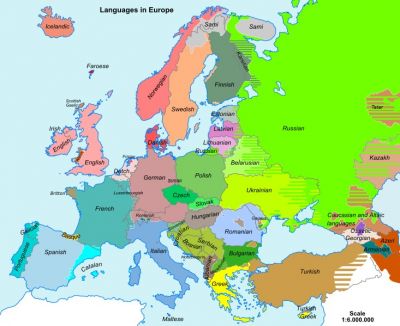Communicating

Languages of Europe - map
Languages
Europe is rich in languages. The main language families in the
EU include Germanic, Romance, Slav and Baltic. The
EU has 24 official languages but there are many other lesserspoken
ones.
More than half of Europeans say that they are able to hold a
conversation in at least one language other than their mother
tongue and a quarter say that they are able to speak at least two
additional languages. During your travels in Europe, try using a
few phrases of the local language when talking to local people.
Here’s how to say ‘thank you’:
Bulgarian - Blagodarya
Croatian - Hvala
Czech - Děkuji
Danish - Tak
Dutch - Bedankt
English - Thank you
Estonian - Aitäh
Finnish - Kiitos
French - Merci
German - Danke
Greek - Efkaristo
Hungarian - Köszönöm
Irish - Go raibh maith aga
Italian - Grazie
Latvian - Paldies
Lithuanian - Ačiū
Maltese - Grazzi
Polish - Dziękuję
Portuguese - Obrigado
Romanian - Mulţumesc
Slovak - Ďakujem
Slovenian - Hvala
Spanish - Gracias
Swedish - Tack
Telephone
There is just one prefix for making international telephone calls. It is 00. The country codes are:
43 - Austria
32 - Belgium
359 - Bulgaria
385 - Croatia
357 - Cyprus
420 - Czech Republic
45 - Denmark
372 - Estonia
358 - Finland
33 - France
49 - Germany
30 - Greece
36 - Hungary
353 - Ireland
39 - Italy
371 - Latvia
370 - Lithuania
352 - Luxembourg
356 - Malta
31 - Netherlands
48 - Poland
351 - Portugal
40 - Romania
421 - Slovakia
386 - Slovenia
34 - Spain
46 - Sweden
44 - United Kingdom
Postage
Postage stamps can only be used in the country in which you buy
them, even when priced in euros.
Electricity
All of Europe has 220–240 volt, 50 cycle alternating current. Ireland,
Cyprus, Malta and the United Kingdom have square three-pin plugs
but, in general, all other EU countries have two-pin plugs. These
may vary but you should be able to use your appliances, such as
hairdryers and shavers, anywhere. Adaptors can usually be bought
in airports and tourist resorts.